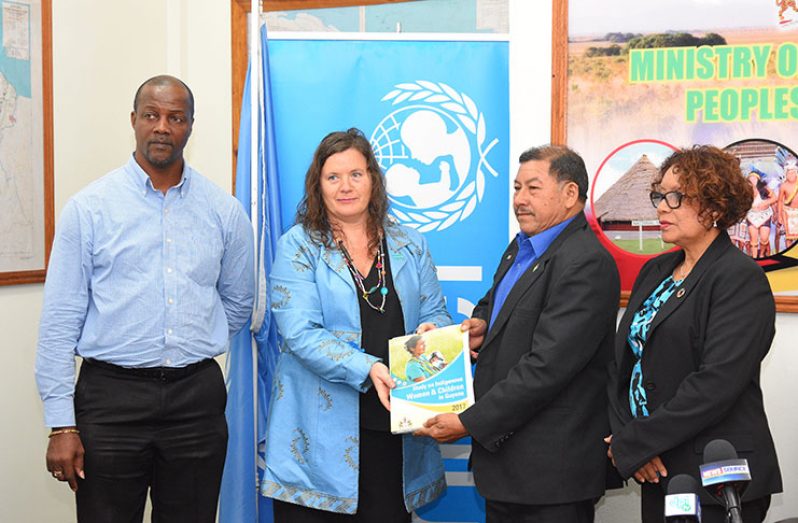Guyana is now the first country in Latin America to complete a study on indigenous women and children which the Government has indicated will help to monitor and improve the livelihood of Guyana’s ‘first peoples’.
This study which was made possible through the collaboration of the Ministry of Indigenous Peoples’ Affairs (MOIPA) and the United Nations Children’s Emergency Fund (UNICEF) found among other things that there is a high level of school drop outs in the hinterland.
The official handing over of the full report and its accompanying Action Plan to Ministers of Indigenous Peoples’ Affairs, Sydney Allicock and Valerie Garrido-Lowe was conducted on Wednesday at the ministry’s boardroom.
The study was compiled over a one-year period and consists of in depth interviews, focus group discussions and qualitative and quantitative data collected from over 1,000 men and women from 12 indigenous communities and 9 regions.
It was embarked upon after the aforementioned parties decided that much more needed to be done to address the disparity between the hinterland and coast in health, education and socioeconomic realities.
Referring to the present situation as an “uneven playground”, Minister Allicock, said that in order for the Government to provide the support needed the study’s qualitative and quantitative data was a necessity.
He commended the work of UNICEF and other stakeholders stating that the document can help to strengthen the revision of the Amerindian Act to influence new legislation for better representation of the group.
“For us to be able to give support to these communities, we need the facts and this document is such a document that we need…we are going to use it and we are going to encourage other members of the indigenous communities and members of the Guyanese society [to use it],” he said.
He described the disadvantages that many of the Guyana’s indigenous people face some having never ventured to the capital while some speak only their mother-tongues eventually facing challenges in the education system.
The Action Plan formulated will allow for the realisation of children and women’s rights and the empowerment of indigenous women, children and adolescents. Playing a crucial role in technical and financial support of the project was UNICEF, represented by Sylvie Fouet who reminded the gathering that Guyana has the largest population of indigenous people in the Commonwealth Caribbean.
She stated that the data provided can help to influence important decisions which form a part of UNICEF’s dedication to ensure “no one is left behind”.
Some of the key findings from the study highlighted were high levels of school dropouts as it was revealed that out of 100 indigenous boys and girls, only 53 would reach the final years of secondary education.
Another finding shows that there are still high percentages of indigenous children younger than five years old who were not registered at birth while some are registered after birth but never receive their birth certificates.
Other findings go into detail on the presence of child mortality, domestic violence, teenage pregnancy, inadequate facilities to accommodate persons with disabilities and more.
Similar remarks came from the Junior Minister of Indigenous People’s Affairs; Valerie Garrido-Lowe said that the Government is committed to ensuring that indigenous women and children are treated fairly and equally.
“What we have had over the years were projects and programmes going into the communities and many of them were not sustainable, many of them failed and the indigenous people remained depended on Government and other agencies for lots of basic support.
“This study will help the ministries to design and help them to understand where to focus…the Government is serious about closing the opportunity gap. The hinterland must have the same opportunities as the coastland in regards to accessing health services, education, infrastructure and all the other services that would give them comfort and empower them,” she said.
In Guyana’s population of 746,955 (2012 census), 10.3 percent are categorized as indigenous people while there are currently 9 indigenous nations settled across the country’s 10 administrative regions.
Soft copies of the Study on Indigenous Women and Children have been made available on the ministry’s website as well as on UNICEF’s for public use.



.jpg)








